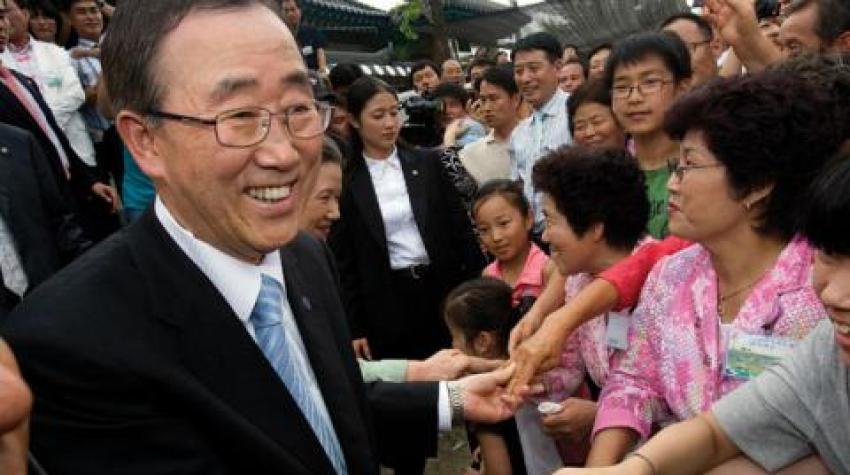September 2015, Nos. 1 & 2 Vol. LII, The United Nations at 70
Long before I became Secretary-General, the United Nations occupied a special place in my life. I was six years old when the Korean War broke out. I have vivid memories of my village in flames as my family sought refuge in nearby mountains. But another image is even more lasting: the sight of the UN flag and the many thousands working under it to respond to our plight. We were saved from hunger by UN food relief operations. We received textbooks from the UN so that my classmates and I could continue our education even though our school had been reduced to rubble. And when we felt scared and alone, and wondered whether the outside world cared about our suffering, the troops of many nations, united in UN blue, sacrificed their lives to restore security and peace. In these ways, the great value of the United Nations was imprinted on me - early, deeply, and, as it has turned out, forever.
Today, millions of people around the world continue to look to the United Nations to ensure their safety, protect their children and help them secure their future. Their needs and aspirations are my driving force. I know from my childhood, and from decades of public service, the immense difference the United Nations can make.
As we mark the 70th anniversary of the United Nations, we can see a world that has changed dramatically since the Charter&rsquos drafters gathered in San Francisco in 1945. Membership in the Organization has grown, and new powers have emerged. Globalization, urbanization, migration, demographic shifts, technological advances, climate change and other seismic developments continue to remake our societies and transform international relations.
We can also look back on a proud record of achievement. The United Nations was founded to prevent another world war, and it has succeeded in that. In most parts of the world, people are living longer, healthier lives. Our efforts have also helped to empower women, advance international law and safeguard the environment.
Yet we are keenly aware that there have been many setbacks along the way, and that today’s landscape is scarred by conflict, exploitation, displacement and despair. In truth, the passage to establishing a world of dignity and peace for “we the peoples” is a never-ending journey.
Despite today’s difficulties and the multiple crises on the UN agenda, I believe that all who work for and with the United Nations are fortunate to be serving at this time. The 70th anniversary falls in a year of potentially momentous decisions on our common future—including the adoption of a transformative new sustainable development agenda and an ambitious agreement on climate change. Progress may take years to achieve. But my hope is that one day, we will look back on our work and proudly say, “We were part of that; we did this together; this is what the United Nations helped to set in motion”
Achieving this shared legacy will continue to demand much from us today. As we do that work, I will think often of the advice given to me when I was in middle school. "Keep your head above the clouds", said our principal, "and your feet firmly planted on the ground—then move step by step."
Keeping your head above the clouds means staying true to your principles. Keeping your feet on the ground means staying connected to the reality of people's lives. And moving forward step by step means taking practical action to realize our goals.
I have tried to take this approach as Secretary-General, armed with the principles of the Charter, the testimony of the people we serve, and above all the dedicated UN staff who, often at their own personal risk, advance our goals. I am keenly aware of the enormous responsibilities entrusted to me—and equally conscious that success at the United Nations is the product of the hard work, sacrifice and example of UN personnel modelling the international collaboration we advocate.
On this anniversary and on every single day, we must use our power and influence to do what is right and what is necessary to uphold the Charter. While we cannot prevent earthquakes and tsunamis, we can do much to address the disasters that arise from human folly and short-sightedness. This is a time of test but far more one of tremendous opportunity. As the distinctions between the national and the international continue to fall away, we can and must use the lessons of 70 years to come together as a single human family and chart a course towards a safer and more sustainable future for all.
The UN Chronicle is not an official record. It is privileged to host senior United Nations officials as well as distinguished contributors from outside the United Nations system whose views are not necessarily those of the United Nations. Similarly, the boundaries and names shown, and the designations used, in maps or articles do not necessarily imply endorsement or acceptance by the United Nations.




